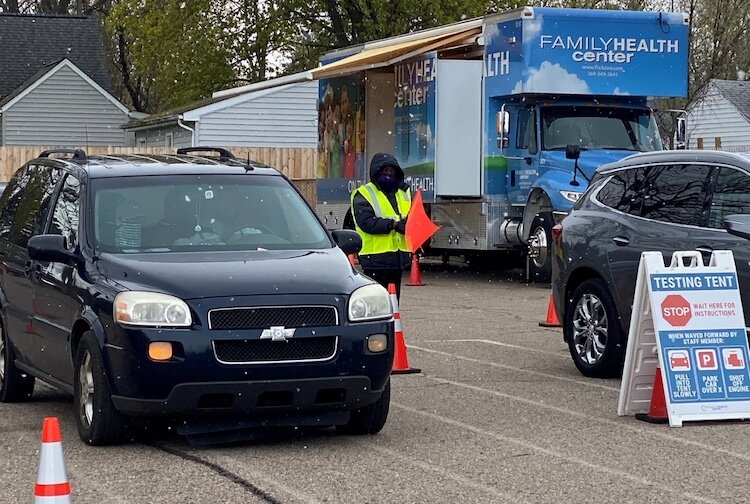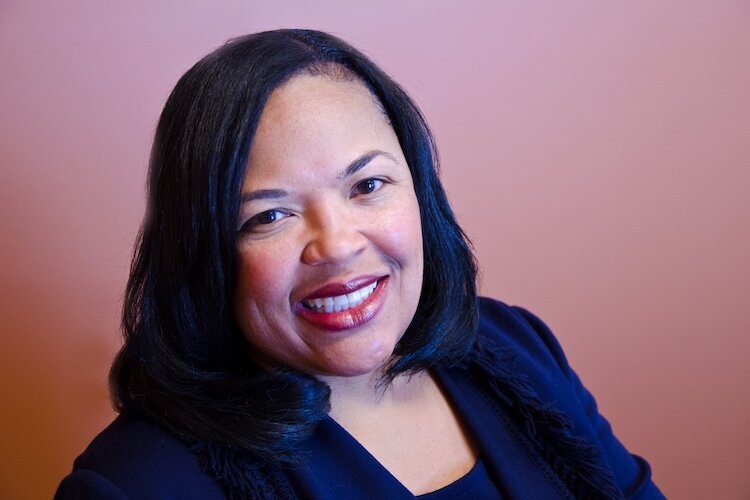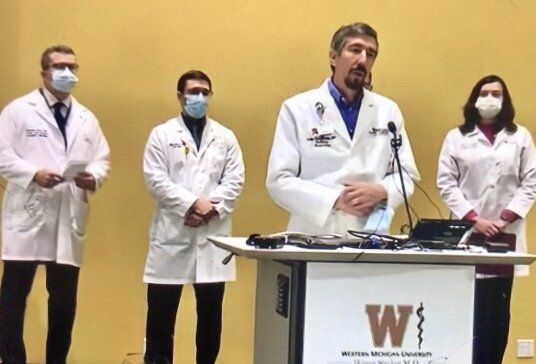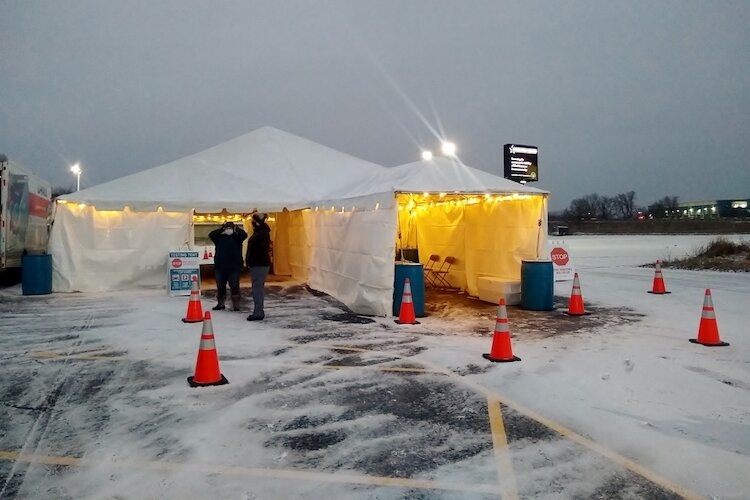Vaccination, masks, and distancing remain keys to fighting COVID-19, Kalamazoo’s medical leaders say
As the fight against COVID-19 continues, the development of a vaccine has been viewed as an intervention and a possible sign of relief. But many people continue to go unvaccinated and unmasked and sickness continues to spread. Medical community leaders in Kalamazoo are asking people to help stop it.
Editor’s note: This story is part of Southwest Michigan Second Wave’s On the Ground Kalamazoo series.
“I’m here. I have what’s necessary to help you,” Denise Crawford says of COVID vaccinations. “I’m making it available to you. And you’re refusing to take it. But you’re still coming to me for help.”
As we wind up the second year in the fight against the coronavirus pandemic, the president and chief executive officer of the Family Health Center in Kalamazoo offered that response on behalf of the medical professionals in her charge and the many medical providers with whom she works.
Medical professionals took an oath to try to save lives, she says. They trained and prepared for that their entire careers. So when COVID struck they saw it as a challenge and a responsibility to protect their communities.
“They just stepped in and continued to go day-in and day-out, extensive hours, never took a break, and never took a vacation,” Crawford says. “But that was year one.”
As the fight continues, the development of a vaccine has been viewed as an intervention and a possible sign of relief, she says. But many people continue to go unvaccinated and unmasked and sickness continues to spread.
“COVID has been difficult for everyone but it has been significantly difficult on the healthcare community,” Crawford says.
Dr. Aaron Lane-Davies, a hospital pediatrician and chief of quality at Bronson Healthcare Group, says that in recent weeks the health system has seen the highest number of COVID-related hospitalizations and deaths since the pandemic started in early 2020. Among people under 60 years of age who have been hospitalized, he says the vast majority are people who have not been vaccinated. And medical professionals are stressed and nearing exhaustion.
According to health data provided by Kalamazoo County Health & Community Services, the transmission level for the virus is high with 3,960 new cases of COVID detected from Jan. 3 to Jan. 9. Of the 249,419 residents of Kalamazoo County age 5 or older, 69.5 percent have received at least one dose of vaccine and approximately 64.1 percent had been fully vaccinated.

Through Monday, Jan. 10, there have been 41,028, confirmed cases of COVID in Kalamazoo County, with 504 resulting in death. There were another 4,573 probable cases, in which 55 resulted in death. Through the start of this week (Jan. 10, 2022), there had been 1.6 million COVID cases in the State of Michigan, resulting in 27,878 deaths.
“It’s a really challenging time, both for our community and for our team,” Lane-Davies says. “We are having to make decisions particularly as it relates to accepting transfers from regional hospitals that we just do not have the capacity for from a bed and staff perspective. Certainly, any person who comes into one of our emergency departments will receive care, but the system is really stretched to the breaking point from a resource perspective.”
The number of hospital beds available to treat incoming patients in Kalamazoo, Allegan, Barry, Berrien, Branch, Calhoun, Cass, St. Joseph, and Van Buren counties is low. Of some 1,329 beds for inpatient treatment, 85.9 percent (1,142) were occupied through Monday. And of the 179 intensive care unit beds, 78.7 (141) were occupied.
More specific to Kalamazoo, Ascension Borgess Medical Center was considered fully occupied. It noted 52 were COVID-19 patients. Bronson Methodist Hospital was considered 96 percent full. It reported 90 were COVID-19 patients.
“The biggest challenge or struggle that we’re facing now is keeping people engaged and very much involved in the process,” Crawford says. “It’s daunting when the community continues to experience such a high level of death and sickness for what in their minds (medical professionals’ mind) is for unnecessary reasons.”
She says medical personnel understand the science “and understand that the virus will continue to reproduce, if you will, into additional variants that continue to become stronger and stronger. And it will continue to impact the population.”
Lane-Davies was among a group of physicians to gather on Dec. 7 to say the rate of infection was surging and to urge people to get vaccinated.
“

You’ve heard the message before: Vaccination is the best way to protect yourself and your family against COVID-19,” said Dr. William Nettleton, medical director of Kalamazoo County Health and Community Services Department and Calhoun County Public Health Department. He urged people to: Get vaccinated against COVID; get vaccinated against Influenza; wear a personal protection mask; get tested when you have symptoms of the illness; get tested three to five days after you’ve been exposed to anyone who has COVID; and get tested prior to attending a public gather.
Dr. Thomas Rohs, a general surgeon and chief medical officer for Ascension Borgess Hospital, said the pandemic is dramatically affecting access to care, meaning that on any given day there are patients from outlying areas who are waiting longer, or simply waiting, to transfer facilities in Kalamazoo to get the care they need for non-COVID maladies as well as for COVID.
Lane-Davies says, “What my colleagues in health care, doctors and nurses, are most discouraged and frustrated by is the disconnect between what actually puts people at risk and what the perceived risk is based on misinformation and from some media outlets.”
What is the strangest reason he’s heard for someone not getting vaccinated?
“I think it’s the ongoing misinformation that people are receiving (through social media) about the relative risk of the vaccine, not taking into consideration the risk of COVID,” Lane-Davies says. “That’s the thing that continues to be the most surprising and most troubling to me — the inability of some media outlets to present the information to them in a balanced way. And that results in people being confused about what are the risks and what are the benefits of being vaccinated versus not.”
Some of those reasons are centered on the fear that there are medical risks to being vaccinated.
People tend to latch on to reports that some people have had serious health outcomes such as having blood clots or heart complications after taking the vaccine. However, incidents of that happening are very rare, Lane-Davies says, and people don’t realize that the risk of a blood clot and heart conditions is much greater for an average healthy person who contracts COVID than it is for people who become vaccinated.
For those worried about vaccinations harming a pregnancy or causing a woman to become infertile, he says, “Those risks are clearly far greater with contracting COVID than they are from the vaccine. All the major obstetric organizations and the government and other health care societies strongly recommend vaccination for women of child-bearing age and women who are pregnant.”
Should people fear the Omicron variant of COVID?

“The data around Omicron is still emerging,” Lane-Davies says. “The evidence is that vaccination provides – particularly with those who have had a booster (shot) — good protection. And symptoms are less severe than those of the Delta variant although most of that data comes from highly vaccinated people. The question in my mind is what is the risk to unvaccinated people? And so it is yet another reason to get yourself vaccinated.”
Asked if COVID, which in its most advanced and serious stages typically requires people to be intubated and physically isolated from everyone but hospital staff members – is not taken as seriously as were past pandemics such as Cholera or the Asiatic Flu, Lane-Davies says he does not know what more evidence should be necessary for people to take COVID serious than the 800,000 people who have already died in the United States.
“I don’t know a family in the community that has not been impacted by this,” he says. “Maybe the public is not seeing this in the way we might have seen (pandemics) 100 years ago with people dying at home. But the toll is just as great if not greater than many of those maladies.”
Would it be a good strategy for people who are young, healthy, and unlikely to be severely impacted by COVID to simply contract the virus and get it over with?
“Many, many young people in this community have had a very hard go with COVID and are having extended symptoms that last for weeks or months,” he says. “And when you contract COVID and are healthy you can still spread that to other people. So the risk is there of you harming another member of this community, a member of your family, a loved one, a parent, a grandparent when you take that approach of saying it’s not a big deal.”
Rohs said, “If you care at all about your family, friends, and neighbors who have cancer, heart disease, diabetes, and so on, get vaccinated so you don’t crowd them out of care they need to live for a problem that you can avoid.”
He said, “Everyone in North America is either going to get vaccinated or you’re going to get COVID.”
Lane-Davies agrees, saying, “That choice is clear from a medical perspective. … The idea that you can skate through the pandemic without being vaccinated and not contract COVID is fantasy.”

















